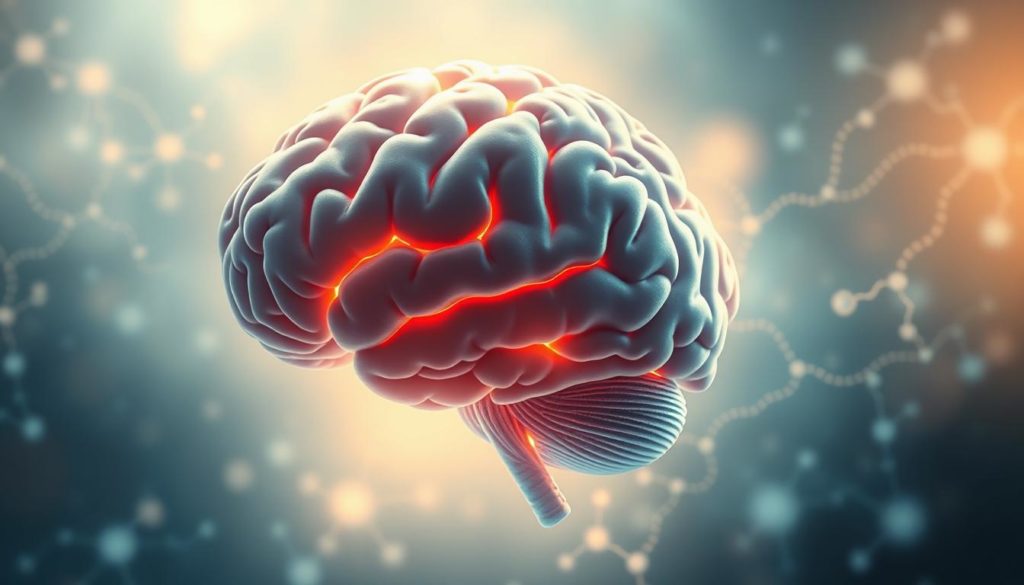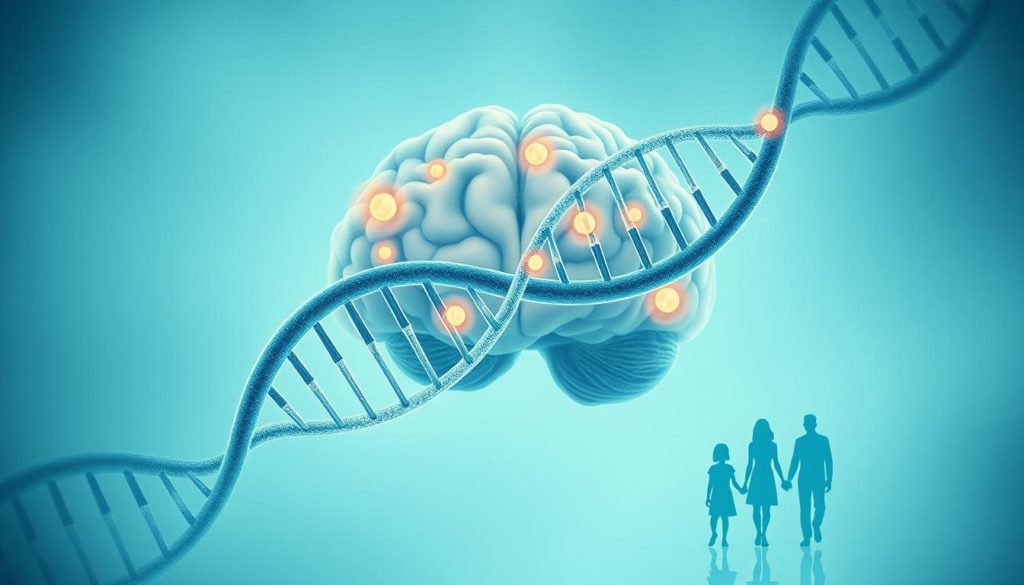Did you know less than 1% of Alzheimer’s cases are genetic? This small number is key to finding new treatments. Experts focus on the link between genes and Alzheimer’s. They study a Colombian family with a unique gene, the Christchurch variant in APOE3. This gene delays Alzheimer’s by about five years for those who have it.
Yakeel Quiroz and Dr. Eliezer Masliah are looking into this gene. They believe copying or inducing this gene could lead to breakthrough treatments. With over 6 million Americans and 55 million people worldwide affected, their work is crucial. Finding out if Alzheimer’s is genetic could lead to new tests and therapies.
The Basics of Alzheimer’s Disease
Alzheimer’s Disease accounts for 60-80% of dementia cases. It brings progressive memory loss, cognitive decline, and loss of executive function. It appears mainly as early-onset Alzheimer’s Disease (EOAD) or familial Alzheimer’s, and late-onset Alzheimer’s Disease (LOAD).

A key feature of Alzheimer’s Disease is amyloid-beta (Aβ) plaques and neurofibrillary tangles (NFTs). These cause the loss of neuronal function. Genetics also plays a crucial role in the disease. The mixture of protein buildup, ongoing neuroinflammation, and environmental factors makes diagnosis and treatment tough.
It’s hard to diagnose Alzheimer’s Disease accurately today. Projects like the Alzheimer’s Disease Neuroimaging Initiative (ADNI) aim to improve early detection. They search for biomarkers for early diagnosis and intervention. However, treatment mainly focuses on managing symptoms instead of the root cause.
Below is a comparative table that highlights key differences between EOAD and LOAD:
| Feature | Early-Onset Alzheimer’s Disease (EOAD) | Late-Onset Alzheimer’s Disease (LOAD) |
|---|---|---|
| Age of Onset | Before 65 | After 65 |
| Genetic Factors | Frequently associated with genetics | A mix of genetics and environmental factors |
| Prevalence | Less common | More common |
| Amyloid-beta Plaques and NFTs | Common | Common |
Genetic Factors in Alzheimer’s Disease
Learning about Alzheimer’s includes looking into how genes might make some people more likely to get it. Important genes, like APOE and others, are a big part of figuring out who might be at risk. These genes help us understand how Alzheimer’s can be passed down in families.

The Role of APOE Genes
The APOE gene is closely linked with Alzheimer’s disease. It has three main types: APOE4, APOE2, and APOE3. Each one affects the risk of getting Alzheimer’s differently:
- APOE4: This type greatly increases Alzheimer’s risk.
- APOE2: This type might protect against Alzheimer’s.
- APOE3: This type doesn’t change Alzheimer’s risk much.
Scientists found a special APOE3 version, called the Christchurch variant, that also protects against Alzheimer’s. This was seen in a family from Colombia that has a history of Alzheimer’s. It shows how complex the genetic side of Alzheimer’s is.
Other Genetic Mutations and Variants
Aside from the APOE gene, there are other mutations linked to Alzheimer’s, especially the kind that starts early in life. Key mutations are in genes like:
- APP: This gene is closely associated with early Alzheimer’s.
- PSEN1 and PSEN2: Mutations in these genes, presenilin 1 and 2, also lead to early Alzheimer’s.
These genes add to our knowledge about how Alzheimer’s is inherited. By looking into these mutations, researchers aim to find out how Alzheimer’s develops. They hope to discover treatments and ways to stop the disease in the future.
Is Alzheimer’s Genetic?
The study of genes and Alzheimer’s has always captured attention. Most Alzheimer’s cases are not directly inherited, yet genetics play a crucial role. Less than 1% are due to specific genes, causing early-onset Alzheimer’s.
Researchers have made big advances in studying Alzheimer’s genetics. The APOE gene, for instance, affects Alzheimer’s risk. This finding leads to more focused genetic tests, helping people know their risk levels.
Genetic testing for Alzheimer’s offers insight into one’s genes, including risky ones. For those with Familial Alzheimer’s disease, this info is very helpful. It aids in understanding risks and future planning.
As we learn more about Alzheimer’s genetics, testing will likely transform how we diagnose and treat it. These changes promise better care and life quality for those facing Alzheimer’s risk.
Familial Alzheimer’s Disease: Understanding the Inherited Form
Familial Alzheimer’s Disease is passed down in families, affecting multiple generations. A common type is Early-Onset Familial Alzheimer’s Disease (EOFAD), which usually starts before 65. It’s important to understand its genetics and seek genetic counseling if it affects your family.
Early-Onset Familial Alzheimer’s Disease (EOFAD)
EOFAD often starts between 30 and 65 years old. It’s linked to mutations in genes like APP, PSEN1, and PSEN2. These mutations greatly increase the risk of early Alzheimer’s, highlighting the need to recognize genetic risks.
Genetic Counseling and Testing
For those with a family history of Alzheimer’s, genetic counseling and testing are key. Genetic counselors help families grasp the risks of Familial Alzheimer’s. They guide them through the testing for gene mutations linked to the disease.
While genetic testing offers important insights, it also raises significant personal and ethical issues. Effective counseling ensures families are informed and ready for outcomes related to their genetic risk.
Role of APOE Gene Variants in Alzheimer’s Risk
The APOE gene is key to understanding Alzheimer’s risk. It has three main types: APOE4, APOE2, and APOE3. Each one affects the chance of getting Alzheimer’s in different ways. Let’s explore these APOE gene types.
APOE4: The Risk Factor
APOE4 greatly ups the risk for Alzheimer’s. Having one APOE4 gene raises your risk. Two copies of the gene? Your risk is even higher. This is because APOE4 leads to more amyloid β plaques in the brain, a key sign of Alzheimer’s.
It’s vital to manage the risks if you have APOE4.
APOE2: The Protective Gene
APOE2, on the other hand, protects against Alzheimer’s. It makes it less likely to get the disease if you have this gene. The APOE2 variant helps stop amyloid β plaque buildup and keeps nerves healthy. Scientists are exploring this to find ways to prevent Alzheimer’s.
APOE3: The Neutral Variant
APOE3 is the most common and is seen as neutral. It doesn’t change Alzheimer’s risk much. Yet, recent research shows APOE3’s effects might be more complicated. This comes from studies like one with a Colombian family.
This shows we need more research on “neutral” APOE variants and their role in Alzheimer’s.
Environmental and Lifestyle Factors Affecting Alzheimer’s Risk
Understanding how different factors lead to Alzheimer’s is key to stopping it. Both our surroundings and how we live impact our chances of getting Alzheimer’s. This shows alongside our genes. We can lessen our risk by focusing on things we can change.
Diet and Nutrition
What we eat affects our brain health. Foods high in antioxidants and good fats help protect our brains. The Mediterranean diet is a perfect example, with its focus on fresh produce and healthy oils. But, too much sugar and bad fats might increase Alzheimer’s risk.
Physical Activity and Cognitive Health
Regular exercise is important for brain health. It boosts blood flow to the brain and helps new brain cells grow. Active people usually face less brain decline and have a lower Alzheimer’s risk.
Environmental Exposures
Being exposed to toxins like air pollution and heavy metals could raise Alzheimer’s risk. Fighting for a cleaner environment and avoiding toxic chemicals are vital steps. This helps prevent Alzheimer’s disease.
Latest Research on Genetics in Alzheimer’s Disease
Recent progress in Alzheimer’s genetics has uncovered new aspects of the disease. Studies, like the one on the Colombian family with the Christchurch APOE3 mutation, are leading this charge. These efforts may lead to new ways to prevent and treat Alzheimer’s, focusing on our genetic make-up.
People with two copies of the APOE4 gene start showing Alzheimer’s signs around 55 years old. This points to a genetic version of Alzheimer’s, as shown in a study. APOE4 carriers see Alzheimer’s symptoms earlier, around 65, unlike those without this gene. This insight is key for the disease’s research, diagnosis, and future treatment plans.
Exploring genome-wide association data is a new hope in Alzheimer’s research. It’s revealing proteins linked to the disease and offering new targets for treatment. Discovering how mutations, like the Christchurch variant, can protect us helps scientists create similar protective strategies.
Breakthroughs in Alzheimer’s genetics may change how we see the disease’s genetic factors. This could lead to more tailored healthcare. Keeping up with genetic studies might bring us closer to significant discoveries.
Case Study: The Colombian Family and the Christchurch Variant
A Colombian family has given scientists new clues about Alzheimer’s disease. Aliria Piedrahita de Villegas was a key participant. She had two copies of a gene, APOE3, with a unique mutation named Christchurch. This genetic twist helped delay Alzheimer’s in her, fascinating researchers.
Scientists also looked at relatives with just one copy of this Christchurch variant. These family members also showed a slower start to memory problems. It highlights how the mutation can protect people from Alzheimer’s. This is a big deal for science.
The study of this family has shed light on the Alzheimer’s Christchurch variant. It shows us new paths for developing treatments based on our genes. This research moves us closer to beating Alzheimer’s disease by studying our genetic makeup.
FAQ
Is Alzheimer’s genetic?
Yes, Alzheimer’s Disease can link to our genes. Some gene mutations like APOE4 affect it. Also, a version of APOE3 called the Christchurch variant does too. While not all cases come from family history, genetic factors strongly influence early-onset Alzheimer’s.
What are the basic facts about Alzheimer’s Disease?
Alzheimer’s is a disease where the brain slowly degenerates. It leads to memory loss and difficulty thinking or making decisions. This disease is behind 60-80% of dementia cases. It has an early and a later stage.
Inside the brain of an Alzheimer’s patient, there are abnormal plaques and tangles. These are not good for brain health.
How do APOE genes influence Alzheimer’s Disease?
APOE genes come in different versions: APOE4, APOE2, and APOE3. APOE4 can make Alzheimer’s more likely. APOE2 may lower the risk. APOE3 is in the middle, but its Christchurch variant can protect against the disease. It delayed Alzheimer’s in a family from Colombia.
Are there other genetic mutations associated with Alzheimer’s?
Yes, mutations in the APP, PSEN1, and PSEN2 genes also play a role. They are linked to a version of Alzheimer’s that starts early in life. People with these mutations tend to get sick younger.
What is Alzheimer’s genetic testing?
Genetic testing for Alzheimer’s looks for specific gene changes. These can be in APOE, APP, PSEN1, and PSEN2 genes. Learning about these changes helps us understand our risk better. This can guide choices about our health care.
What is Familial Alzheimer’s Disease (FAD)?
FAD is the type that families pass down. It often comes from changes in certain genes like APP, PSEN1, and PSEN2. If you have FAD, you might get Alzheimer’s before turning 65.
What is early-onset familial Alzheimer’s Disease (EOFAD)?
EOFAD is Alzheimer’s that shows up before 65. It’s usually inherited. Gene changes in APP, PSEN1, and PSEN2 are often to blame. Families with EOFAD history should think about genetic counseling and testing. It helps understand and manage risks.
How important is genetic counseling and testing in Alzheimer’s?
For families with Alzheimer’s history, genetic counseling and testing are key. They offer risk assessment, vital information for catching the disease early, and help plan for the future in terms of prevention and care.
What are the roles of the APOE variants in Alzheimer’s risk?
APOE4 can raise the risk of Alzheimer’s. Having two copies of APOE4 is especially risky. On the other hand, APOE2 can protect against the disease. APOE3 is neutral, but its Christchurch variant can delay Alzheimer’s onset.
How does diet and nutrition impact Alzheimer’s risk?
What we eat matters a lot for brain health. Eating foods high in antioxidants and omega-3s, and low in sugar and bad fats can help. This kind of diet can keep your brain strong and lower Alzheimer’s risk.
What is the effect of physical activity on Alzheimer’s?
Moving your body is good for the brain. Exercise makes the brain more flexible, lowers inflammation, and makes us feel better overall. It can help keep Alzheimer’s at bay.
How do environmental exposures influence Alzheimer’s risk?
Things like air pollution, pesticides, and other toxins can raise the risk of getting Alzheimer’s. This is especially true if you’re already genetically at risk. It’s wise to avoid these harmful exposures when you can.
What are the latest research developments in Alzheimer’s genetics?
Scientists are learning a lot about genetics and Alzheimer’s. For example, they’re studying the Christchurch variant found in a family from Colombia. This research is helping us find new ways to prevent the disease and treat it based on our genes.
What did the case study of the Colombian family reveal about the Christchurch variant?
The Colombian family study showed something amazing. Their version of the APOE3 gene, the Christchurch variant, helps fight off Alzheimer’s. It delays the start of the disease. This finding could lead to new treatments that mimic this genetic protection.


